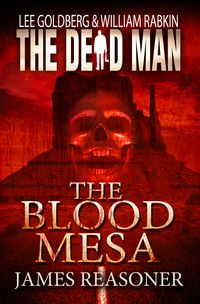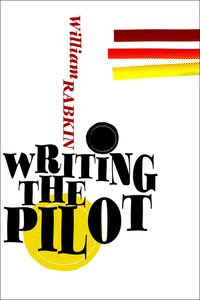Month: July 2011
THE DEAD MAN #5: THE BLOOD MESA
 THE DEAD MAN #5: THE BLOOD MESA by James Reasoner, the laziest writer on the friggin' planet, is out today in ebook and paperback editions…and it's perhaps the bloodiest tale yet in the series. Matt Cahill finds himself trapped atop a blood-red mesa in the desolate American Southwest when an archeological dig goes terribly, dangerously wrong, awakening an ancient evil with an insatiable hunger. Now Matt, armed only with his trusty ax, must somehow escape…rescue a handful of terrified innocents… and prevent a slaughter of epic proportions.
THE DEAD MAN #5: THE BLOOD MESA by James Reasoner, the laziest writer on the friggin' planet, is out today in ebook and paperback editions…and it's perhaps the bloodiest tale yet in the series. Matt Cahill finds himself trapped atop a blood-red mesa in the desolate American Southwest when an archeological dig goes terribly, dangerously wrong, awakening an ancient evil with an insatiable hunger. Now Matt, armed only with his trusty ax, must somehow escape…rescue a handful of terrified innocents… and prevent a slaughter of epic proportions.
He talks on the Dead Man Blog about his experience writing it. He says:
it has strong elements of horror and the supernatural, and for the most part this is unexplored territory for me in my work. True, I’ve done a few Westerns that had mild supernatural elements (often of the Scooby-Doo variety!), but THE BLOOD MESA is the first real horror novel I’ve written, even though I’ve been a reader and fan of horror for many, many years. But most important of all for me, writing THE BLOOD MESA was fun, just as I thought it would be. I had an absolutely great time with it,
And you're going to have a blast reading the book, which is already getting some great reviews. Like these:
If you like horror with a dash of suspense then you should read the DEAD MAN series. They are not only fun but addictive […] All of the books in the series are great and THE BLOOD MESA is no exception. On a scale of 1 to 5, I give it a 5! – Futures Mystery Anthology Magazine
I dare say Reasoner also offers up the most gruesome iteration in The Dead Man so far, as some of the deaths in this one are nothing less than brutal. - Wag the Fox
This story is the literary equivalent to a drag strip race […] the story keeps accelerating until its brutal climax. That truly is its strength – it's rapid fire pace and its unflinching brutality (which you've got to expect from a series featuring an axe wielding hero). ––Permission to Kill
The story riffs off of some creepy western themes, with a hefty dose of cannibalism, whacko/zombie-movie mania, and did I mention there's a few sticks of dynamite thrown in for good measure? […]It is highly recommended. – Post Modern Pulps
If you like this book, you're going to want to grab the previous books in the DEAD MAN series:
FACE OF EVIL by Lee Goldberg & William Rabkin
RING OF KNIVES by James Daniels
HELL IN HEAVEN by Lee Goldberg & William Rabkin
THE DEAD WOMAN by David McAfee
Coming in August… KILL THEM ALL by Harry Shannon.
Here Comes the Slush
The ease of self-publishing has been great for mid-list authors and authors with big, out-of-print backlists. But it also means that anybody with a mouse and an Internet account can be "published."
Naturally, aspiring authors love this…now there are no gatekeepers keeping their masterpieces from the hands of the reading public. But, as it turns out, readers aren't so thrilled that the slush pile has spilled over onto their Kindles, as Eric Felton writes in a piece today for the Wall Street Journal.
It isn't just the elusive prospect of riches that excites the untold thousands of hopefuls crowding into the new self-publishing space. They are buoyed by escaping the grim frustrations of trying to get published the old-fashioned way. No more form-letter rejections from know-nothing agents and can't-be-bothered editors.
It's only natural for those locked out to despise the gatekeepers, but what about those of us in the reading public? Shouldn't we be grateful that it's someone else's job to weed out the inane, the insipid, the incompetent? Not that they always do such a great job of it, given some of the books that do get published by actual publishers. But at least they provide some buffer between us and the many aspiring authors who are like the wannabe pop stars in the opening weeks of each "American Idol" season: How many instant novelists are as deluded as the singers who make with the strangled-cat noises believing they have Arethaen pipes?
[…]The stodgy old gatekeepers are to be replaced with "social media." But self-publishers are finding that getting the attention of the crowd once their e-books are out there isn't easy. Which leads to efforts to game the judgment of the new and amorphous network of influence.
Look in the forums Amazon hosts for its Kindle "direct publishers" and you won't find many posts asking how to do the basics of traditional book production—copy editing, anyone? But there are plenty of threads with titles like "Promote your book" and "review swapping?"—orgies of desperate back-scratching that make old-school literary logrolling seem downright genteel.
He is so right. In their eagerness to be the next Amanda Hocking, hordes of self-published authors are forgetting the most important elements for success: genuine talent, a fresh voice, a great story and strong writing skills.
Michael Silverblatt Has Become David Caruso
..and by that I mean he has become a outrageous spoof of himself, as my brother Tod so deftly illustrates on his blog with an excerpt from this week's Bookworm on NPR.
Silverblatt: I am speaking with Geoff Dyer, who I consider to be possibly the best writer of…I won't say of novels and I won't say of essays, but of the strange inter-ground between them and because he, in a sense, unbuttons and allows the informality of the dissatisfied self to take the place of that vastly seniorial literary critic type who could only recite his dissatisfaction because this or that strayed from the tradition. With you it's very different.
Dyer:…yeah…I think this is one of those classic Silverblatt questions in that I'm not sure I have a response to it, other than to say thank you and yes, I agree. That is…there is…that is…there is…that's what's going on.
You've got to hand it to Dyer…he's one of the few authors who has actually responded to one of Silverblatt's bloated, nonsensical ramblings by basically saying: "I have no idea what the fuck you just said, you pompous windbag."
Tod does a hilarious, pitch-perfect imitation of Silverblatt (and, in fact, once regaled his friends with it in the green room at the Los Angeles Times Festival of Books without realizing the windbag was sitting behind him). Here's an example:
Silverblatt: Today I'm pleased to welcome Mark Danielewski author of Only Revolutions, a novel which reminds me of another book, another word, another river of time that winds through a cloud of violence, which, like time, reminds me of Bonnie & Clyde and, more specifically, Badlands, and by "remind" I mean, within my own mind, and by mind, I mean the long rush of space where man is an incarnation of disconnection, and in disconnection, as e.e. cummings once said, and which I paraphrase here, as a highway paraphrases a road, or a road paraphrases a worm hole through space, if space is narrative and e.e. cummings is symbol that really means Mike Tyson, everyone has a plan until they get hit in the face, which, truly, Mark, this novel feels like…a punch in the face of time, and by time, I mean violence, and by violence, I mean fisting, and by fisting I mean, and here I'd like your thoughts, the way your book can be read backwards like the Torah, or upside down like a man wearing moon boots, or side to side like a roller derby fight. Yes?
Danielewski: Yes, yes, absolutely. Whatever. Can someone get my publicist on the phone? Her name is Kim Dower. Someone get me Kim fucking Dower!
I Hate William Rabkin
 William Rabkin has a new screenwriting book out on the Kindle — Writing The Pilot — and I hate him for it.
William Rabkin has a new screenwriting book out on the Kindle — Writing The Pilot — and I hate him for it.
I hate him because I only meant to browse the book the other day…but I ended up getting sucked in by his engaging, smart, and entertaining voice and spent all !@#$% night reading it.
I hate him because it would be the perfect update for our long-in-print screenwriting book Successful Television Writing.…and now it won't be, the greedy bastard.
And I hate him because I actually learned some things about a subject I thought I knew at least as well as Bill, my best & oldest friend and my long time writing partner…who also happens to be Adjunct Professor of creative writing in the University of California, Riverside's MFA Program, Palm Desert Graduate Center, and also teaches television writing at the UCLA Extension.
But even through my blinding hate, I have to admit he's a terrific and justifiably beloved teacher and that Writing the Pilot is both extremely entertaining and jam-packed with useful information.
His analysis of what makes a great pilot…vs what makes a great opening episode for a series…is simply brilliant.
His indepth analysis of the pilots for Fast Forward, Life on Mars and Fringe were particularly smart and insightful. He also deftly uses examples from our own career, in particular our unproduced CBS pilots Ella Clah and Silhouette, to illustrate the thought-process behind developing and writing pilots (and candidly discusses some of mistakes along the way and what we learned from them).
Spec TV pilots are all the rage right now, contrary to what we said years ago in the last chapter of our Successful Television Writing, and his book couldn't be more timely. If you want to get into the TV biz, or if you are a veteran TV pro struggling with pilot-writing issues, Writing the Pilot is a must-read.
The book will soon be available in trade paperback and Nook versions as well.
(Pictured: Tod Goldberg, me, and Bill Rabkin signing at the Los Angeles Times Festival of Books in 2010)
UPDATED 8/19/2011 to add new cover.

